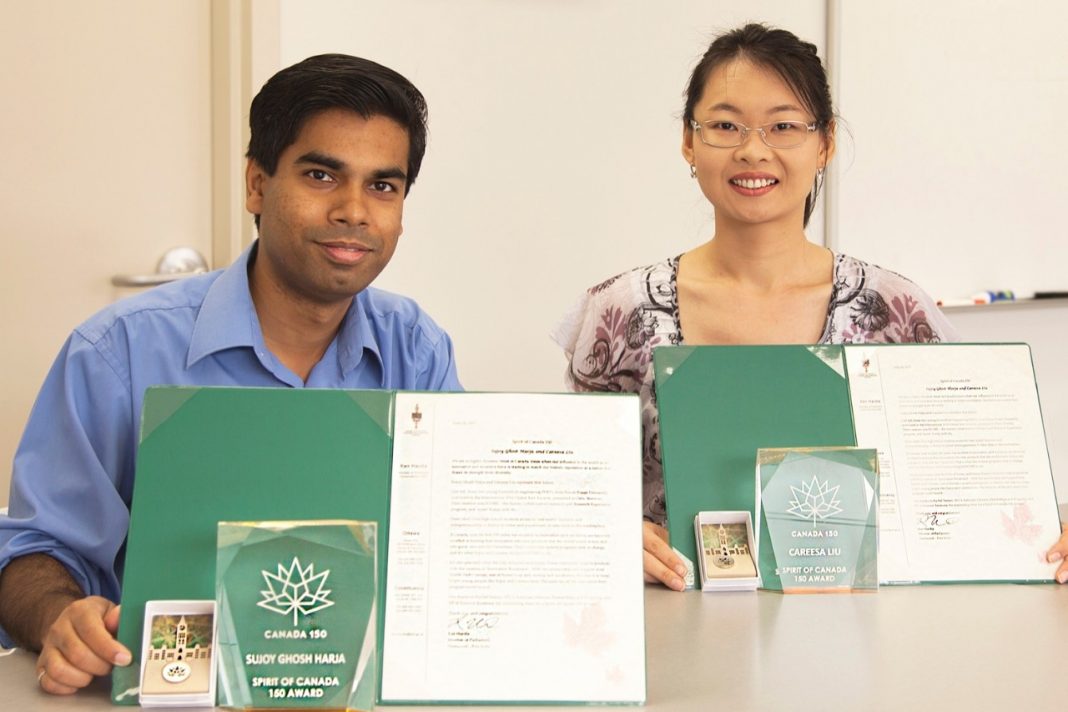Two Simon Fraser University PhD students are getting recognized locally and nationally for their innovative student training program, one that combines the fields of engineering, entrepreneurship, and science.
Sujoy Ghosh Hajra and Careesa Liu, PhD candidates in biomedical engineering, were awarded the Spirit of Canada 150 Awards earlier this fall, which recognizes individuals who have made a significant difference in their community.
The duo founded the Surrey Collaborative Outreach and Research Experience (SCORE) program in 2014, which is a multifaceted partnership between academic, business, healthcare, and research entities that trains students at high school to post-secondary levels with hands-on skills in cutting-edge technological research.
“By bringing together a diverse group of [stakeholders], SCORE is able to provide a multifaceted, holistic view of the world to our participants,” said Hajra. “The combination of technical hands-on training and translational skills development allows SCORE to provide its participants with a [unique learning experience].”
The program is based in Surrey, BC, situated within the growing health and technology initiative known as Innovation Boulevard, which comprises four universities, about 70 small and medium enterprises, and multinational corporations.
“Our vision was to concurrently develop the future generation of highly qualified personnel to be leaders in health technology innovations.” – Sujoy Ghosh Hajra, SCORE co-founder
The SCORE program was developed by Hajra and Liu because they felt that Surrey’s workforce was not experiencing much growth in comparison to its infrastructure.
“As team members who helped build the Surrey Innovation Boulevard from the ground up, our vision was to concurrently develop the future generation of highly qualified personnel to be leaders in health technology innovations. While there had been significant infrastructure development and capacity building, we wanted to also focus on people and the development of human capital,” explained Hajra.
The SCORE program operates during summer and successful applicants are enrolled for eight or 16 weeks depending on their level of education, according to Hajra. The program is also free of charge to its participants.
The types of research that are conducted include development of technologies in medical diagnostics and therapeutics, assisted living and home health care, and advancing knowledge in digital health.
Some of the program’s past projects include developing and testing software and hardware prototypes for breakthrough technologies in brain function assessment, creating software platforms that advance clinical assessment tools for diseases such as multiple sclerosis, and conducting market research for infant health monitoring technologies.
“SCORE trainees have worked on a variety of projects over the last four years, and the output from these efforts are in various stages of validation testing, clinical trials, and regulatory approvals. For example, five projects created by the SCORE trainees during this year’s program are currently in validation testing for future deployment,” stated Hajra.
Hajra also noted that the global healthcare industry is becoming increasingly dependent on technology-based solutions, with the primary example being healthcare apps. “The global healthcare industry is undergoing transformative changes fueled by technology-based solutions . . . This is increasingly creating opportunities for professionals trained in traditional medical technologies such as sensors and medical imaging, as well as in emerging areas such as big data health analytics and personalized medicine,” said Hajra.
Going forward, the SCORE program will provide more critical training and mentorship opportunities to students who are interested in these growing areas, Hajra concluded.




